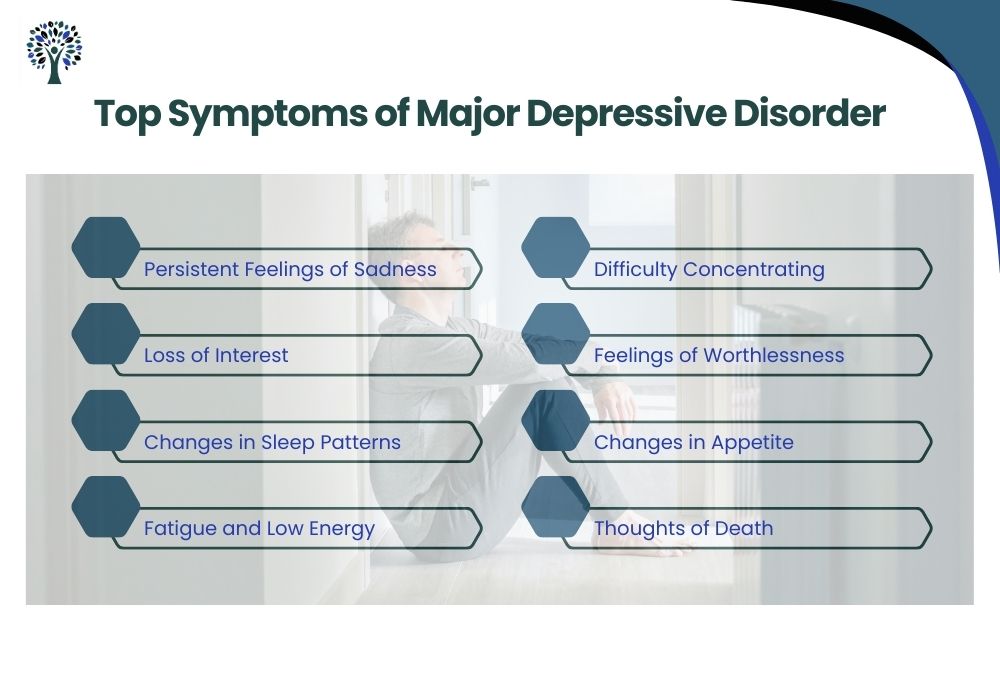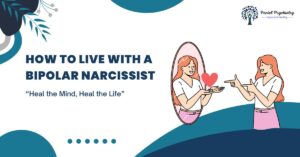Major Depressive Disorder (MDD), also known simply as depression, is a serious mental health condition that affects millions of people worldwide. It goes beyond occasional feelings of sadness or low energy and can impact every aspect of a person’s life. If you or a loved one are experiencing the symptoms of depression, it’s essential to recognize them early and seek the proper treatment.
In this blog post, we will explore the top symptoms of Major Depressive Disorder and why it’s important not to ignore them. By understanding these symptoms, you can take the first steps toward finding the right treatment and improving your quality of life.
Top Symptoms of Major Depressive Disorder

1. Persistent Feelings of Sadness or Hopelessness
One of the hallmark signs of Major Depressive Disorder is persistent feelings of sadness or hopelessness that don’t seem to go away. Unlike the occasional bad day, depression makes these feelings last for weeks or even months.
People with MDD may feel like there’s no way out of their emotional pain, believing that things will never improve. They might have a pessimistic outlook and feel nothing will bring joy or satisfaction. This sense of hopelessness can be overwhelming and may contribute to thoughts of worthlessness or even suicidal ideation, which is why it’s crucial to seek professional help if you experience these feelings.
2. Loss of Interest or Pleasure in Activities
Another common symptom of Major Depressive Disorder is anhedonia or the loss of interest in activities that once brought pleasure or fulfillment. This can affect hobbies, socializing, work, and even simple pleasures like eating or spending time with family.
When someone with depression loses interest in these activities, they may start withdrawing from friends, family, and their usual routine. This symptom can be especially distressing because it creates a disconnect, making the individual feel isolated and alienated from others.
If you notice that you or a loved one no longer enjoys things that once sparked excitement or joy, it’s time to consider that depression may be the cause.
3. Significant Changes in Sleep Patterns
Sleep disturbances are very common in Major Depressive Disorder, and they can present in two main ways:
- Insomnia: Difficulty falling asleep or staying asleep during the night. People with depression may wake up multiple times during the night or wake up far too early in the morning and not be able to return to sleep.
- Hypersomnia: On the other end, some individuals with depression may sleep excessively, feeling the need to sleep for extended periods, but still wake up feeling tired and unrefreshed.
Sleep issues can exacerbate other symptoms of depression, such as fatigue and difficulty concentrating, so it’s important not to overlook these symptoms.
4. Fatigue and Low Energy
Depression often leaves people feeling constantly fatigued, even after a full night’s rest. This overwhelming sense of exhaustion can make it incredibly difficult to get through daily tasks. Simple things like getting out of bed, going to work, or completing household chores can feel insurmountable.
This persistent fatigue is different from regular tiredness in that it does not improve with rest or sleep, and it can affect the individual’s ability to function. The lack of energy can make even the smallest tasks seem exhausting and unmanageable.
5. Difficulty Concentrating or Making Decisions
Depression can cloud your thinking and impair your cognitive function. People with MDD may find it hard to concentrate on tasks, whether at work or in their personal lives. This symptom is often referred to as “brain fog,” and it can make it difficult to process information or complete tasks that require focus.
In addition to concentration issues, people with depression often struggle with decision-making. Everyday decisions, like choosing what to eat or what to wear, can feel overwhelming. This lack of mental clarity and the inability to focus can significantly affect work performance and personal relationships.
6. Feelings of Worthlessness or Guilt
Another core symptom of Major Depressive Disorder is pervasive feelings of worthlessness or excessive guilt. Individuals may excessively criticize themselves or feel that they are a burden to others. They may ruminate over past mistakes, even minor ones, and believe they are undeserving of love or happiness.
These feelings can lead to a sense of self-loathing and may be accompanied by intrusive thoughts that contribute to the individual’s emotional distress. It is important to recognize that these thoughts are a symptom of depression and not a reflection of reality.
7. Changes in Appetite or Weight
Depression can cause significant changes in appetite and weight. Some people may experience a complete loss of appetite and consequently lose weight, while others may turn to food for comfort, leading to weight gain.
These changes in eating habits can be a sign of depression because they are often linked to changes in mood and energy levels. For example, when someone feels down, they may lack the motivation to cook or eat properly, or they may use food as a way to numb their emotions. Monitoring changes in appetite can be an essential step in identifying the onset of depression.
8. Physical Ailments Without Clear Causes
Many people with Major Depressive Disorder experience unexplained physical symptoms, such as headaches, digestive issues, body aches, or chronic pain. These symptoms may not respond well to standard treatments and may persist despite medical intervention.
While these physical symptoms might seem unrelated to mental health, they are often a sign that depression is affecting the body. Depression can lead to an increase in stress hormones, which can contribute to physical discomfort.
9. Thoughts of Death or Suicide
Perhaps the most concerning symptom of Major Depressive Disorder is thoughts of death or suicide. These thoughts may come in the form of wishing to not wake up in the morning, planning suicide, or experiencing an intense desire to escape emotional pain.
If you or someone you know is experiencing thoughts of self-harm or suicide, it’s critical to seek immediate help from a mental health professional or a helpline. These thoughts are a serious medical emergency, and with proper treatment, recovery is possible.
10. Irritability and Agitation
While depression is often associated with sadness, many individuals with MDD may feel irritable or angry. This can manifest as frustration with small inconveniences, becoming easily upset or upset by things that wouldn’t normally trigger such a strong response.
Irritability, along with the other symptoms of depression, can have a significant impact on relationships with family, friends, and colleagues, and should not be dismissed as simple mood swings.
Recognizing the symptoms of Major Depressive Disorder is the first step toward managing and overcoming this challenging condition. If you or someone you love is experiencing any combination of these symptoms, it’s important not to ignore them. Depression is a medical condition that requires professional help, but with the right treatment, recovery is possible.
At Peniel Psychiatry, we specialize in diagnosing and treating depression with a personalized approach that includes therapy, medication, and support. If you or a loved one are experiencing symptoms of depression, don’t wait. Contact us today to schedule an appointment and begin your path to healing.
Conclusion:
Recognizing the symptoms of Major Depressive Disorder is the first step toward managing and overcoming this challenging condition. If you or someone you love is experiencing any combination of these symptoms, it’s important not to ignore them. Depression is a medical condition that requires professional help, but with the right treatment, recovery is possible. At Peniel Psychiatry, we specialize in diagnosing and treating depression with a personalized approach that includes therapy, medication, and support. If you or a loved one are experiencing symptoms of depression, don’t wait. Contact us today to schedule an appointment and begin your path to healing.




